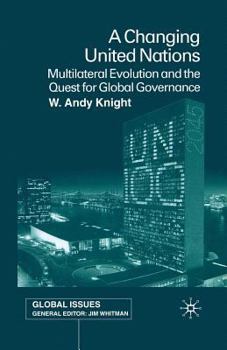A Changing United Nations: Multilateral Evolution and the Quest for Global Governance
Select Format
Select Condition 
Book Overview
The United Nations is at a critical juncture. It is faced with two distinct choices: to remain a 'decision frozen in time' or to develop a long-term adaptation agenda (and strategy) that would allow it to be a relevant institution of global governance for the twenty-first century. Reform and reflexive institutional adjustments have failed to address underlying problems facing this organization. After fifty-five years of existence it is still considered...
Format:Paperback
Language:English
ISBN:1349421197
ISBN13:9781349421190
Release Date:January 2000
Publisher:Palgrave MacMillan
Length:257 Pages
Weight:0.75 lbs.
Dimensions:0.6" x 6.5" x 8.7"
Customer Reviews
0 rating





